2015 PEP 新人教版六年级第一单元阅读练习
PEP人教版小学六年级上册英语第一单元阅读试题及答案

PEP 六年级上第一单元课外阅读训练一、阅读短文,根据短文内容判断。
正确的写T,错误的写F。
Today , I want to go to the museum. From my school I go straight and turn left at the post office. I can see the bookstore there. From there I go straight head. Then , at the cinema I turn right. Finally, I’m at the museum. It’s not far.( ) 1.From school , go straight and turn right at the post office.( ) 2.I want to go to the school.( ) 3.From the post office, I can see the bookstore .( ) 4.I should turn right at the cinema.( ) 5.The museum is far .二、读下面的对话,根据对话内容填空。
Wu Yifan is calling Mike.Wu Yifan: Hi, Mike . Let’s go to the cinema.Mike: Sure. How can I get there ?Wu Yifan: Go to Main Street. Turn left at the bookstore. The cinema is next to the bookstore. See you soon.Mike : Ok. Bye.1.Wu Yifan wants to go to the _________.2.First they go to the Main Street. Then _________ _______ _________ the bookstore.3.The cinema is ________ _______ the bookstore.三、阅读下面的对话,根据对话内容选出合适选项。
人教部编版六年级语文第一单元主题阅读训练(含答案)

人教部编版六年级语文主题阅读训练第一单元阅读主题本单元主题为“百里不同风,千里不同俗”。
主要由《北京的春节》《腊八粥》《古诗三首》《藏戏》四篇课文组成。
这样编排的主要目的是为了让孩子能够了解不同地方的特色与风俗,感受不同地方的风采,体会不同的趣味。
阅读方法1.分清内容的主次,体会作者是如何详写主要部分。
并能在习作时,能注意抓住重点,写出特点。
2.反复朗读理解课文内容。
本单元的四篇课文都生动有趣,耐人寻味。
北京春节的热闹非凡,腊八节的香味袭人,藏戏的生动有趣都需要仔细阅读才能体会到不同节日的快乐与享受。
教学时注意引导学生在学习课文时一定要分配充裕的时间进行多种形式的朗读。
3.体会作者用语言塑造人物形象的特点,关注人物语言描写的不同形式,利用关键词句,揣摩心理的策略,加深对人物形象的感知。
精彩片段阅读《北京的春节》片段。
孩子们准备过年,第一件大事就是买杂拌儿。
这是用花生、胶枣、榛子、栗子等干果与蜜饯掺和成的。
孩子们喜欢吃这些零七八碎儿。
第二件大事是买爆竹,特别是男孩子们。
恐怕第三件事才是买各种玩意儿——风筝、空竹、口琴等。
孩子们忙乱,大人们也紧张。
他们必须预备过年吃的、喝的、穿的、用的,好在新年时显出万象更新的气象。
腊月二十三过小年,差不多就是过春节的“彩排”。
天一擦黑,鞭炮响起来,便有了过年的味道。
这一天,是要吃糖的,街上早有好多卖麦芽糖与江米糖的,糖形或为长方块或为瓜形,又甜又黏,小孩子们最喜欢。
1.解释词语:万象更新:。
2.文中破折号的作用是()A. 表示意思的转换,跳跃或转折B. 表示解释说明C. 表示意思的递进D. 表示插说3.选文中的一个过渡句是。
4.大人们也紧张是因为。
5.孩子们准备过年要做的事都有什么?美文欣赏中秋赏月每逢中秋来临,赏月玩月便成为人们久谈不衰的话题。
有诗道:“明月四时有,何事喜中秋?”为何人们独独钟情于中秋赏月呢?从时令上说,中秋是“秋收节”。
自古以来,人们便在这个季节饮酒舞蹈,喜气洋洋地庆祝丰收。
人教pep小学六年级上册英语阅读理解练习题及答案(1)解析
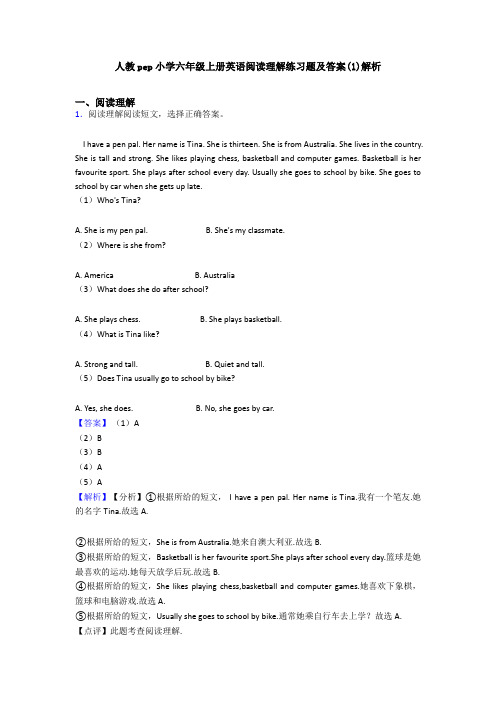
人教pep小学六年级上册英语阅读理解练习题及答案(1)解析一、阅读理解1.阅读理解阅读短文,选择正确答案。
I have a pen pal. Her name is Tina. She is thirteen. She is from Australia. She lives in the country. She is tall and strong. She likes playing chess, basketball and computer games. Basketball is her favourite sport. She plays after school every day. Usually she goes to school by bike. She goes to school by car when she gets up late.(1)Who's Tina?A. She is my pen pal.B. She's my classmate.(2)Where is she from?A. AmericaB. Australia(3)What does she do after school?A. She plays chess.B. She plays basketball.(4)What is Tina like?A. Strong and tall.B. Quiet and tall.(5)Does Tina usually go to school by bike?A. Yes, she does.B. No, she goes by car.【答案】(1)A(2)B(3)B(4)A(5)A【解析】【分析】①根据所给的短文, I have a pen pal. Her name is Tina.我有一个笔友.她的名字Tina.故选A.②根据所给的短文,She is from Australia.她来自澳大利亚.故选B.③根据所给的短文,Basketball is her favourite sport.She plays after school every day.篮球是她最喜欢的运动.她每天放学后玩.故选B.④根据所给的短文,She likes playing chess,basketball and computer games.她喜欢下象棋,篮球和电脑游戏.故选A.⑤根据所给的短文,Usually she goes to school by bike.通常她乘自行车去上学?故选A.【点评】此题考查阅读理解.2.阅读理解阅读理解I am a schoolboy. I have lessons from Monday to Friday. On Sunday morning, I usually get up very late. I wash my face and then go out to do morning exercises. It is about nine o'clock. After I eat my breakfast. I often go to the park with my parents. The park is not far (远) from our home, so we go there by bike. It takes us about ten minutes to get there by bike. There are many people in the park. They are men and women, old and young. Parents must look after their children. There is a big lake in the middle of the park. Some children are swimming, some are boating with their parents. I like boating very much. I want to boat, too. My parents buy three tickets. We have a good time there. How happy we are!(1)I have lessons ______days a week. ( )A. fourB. fiveC. sixD. seven(2)I often ______ on Sundays. ( )A. go to schoolB. get up earlyC. get up lateD. go to bed late(3)On Sundays, there are _______ people in the park. ( )A. muchB. very muchC. a littleD. lots of(4)I like ______ very much. ( )A. playing basketballB. boatsC. swimmingD. boating(5)I'm boating in the park with my ______. ( )A. good friendsB. father and motherC. classmatesD. teachers【答案】(1)B(2)C(3)D(4)D(5)B【解析】【分析】本题考查学生阅读篇章的能力。
人教pep小学六年级上册英语阅读试题及答案
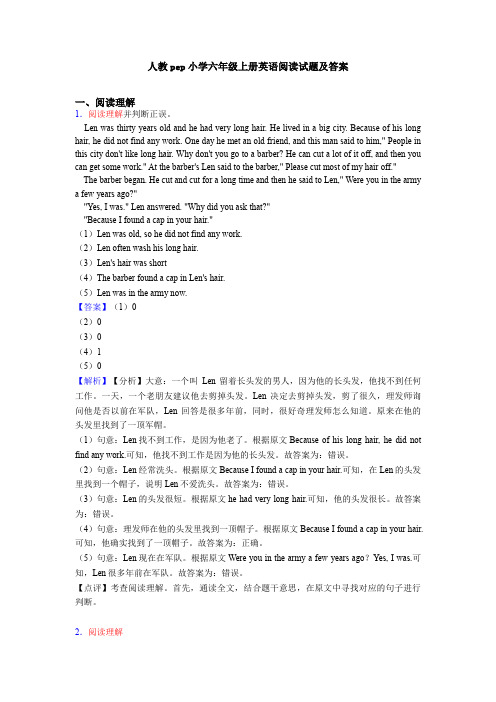
人教pep小学六年级上册英语阅读试题及答案一、阅读理解1.阅读理解并判断正误。
Len was thirty years old and he had very long hair. He lived in a big city. Because of his long hair, he did not find any work. One day he met an old friend, and this man said to him," People in this city don't like long hair. Why don't you go to a barber? He can cut a lot of it off, and then you can get some work." At the barber's Len said to the barber," Please cut most of my hair off."The barber began. He cut and cut for a long time and then he said to Len," Were you in the army a few years ago?""Yes, I was." Len answered. "Why did you ask that?""Because I found a cap in your hair."(1)Len was old, so he did not find any work.(2)Len often wash his long hair.(3)Len's hair was short(4)The barber found a cap in Len's hair.(5)Len was in the army now.【答案】(1)0(2)0(3)0(4)1(5)0【解析】【分析】大意:一个叫Len留着长头发的男人,因为他的长头发,他找不到任何工作。
PEP人教版六年级英语上册《阅读理解与写作真题专项归类卷》(附答案)
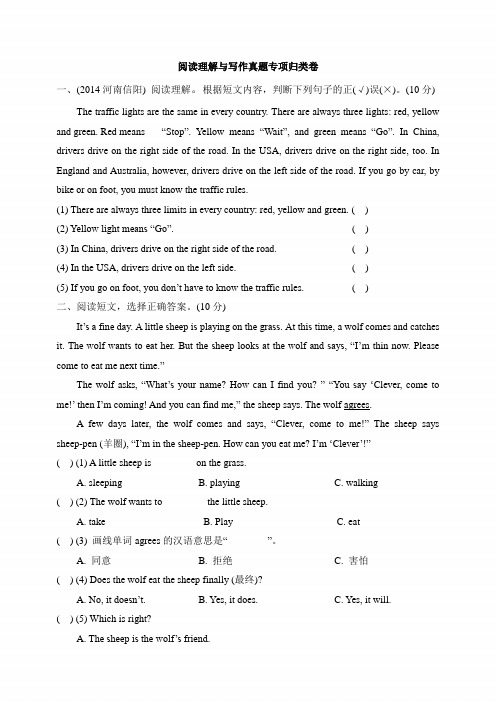
阅读理解与写作真题专项归类卷一、(2014河南信阳) 阅读理解。
根据短文内容,判断下列句子的正(√)误(×)。
(10分)The traffic lights are the same in every country. There are always three lights: red, yellow and green. Red means “Stop”. Yellow means “Wait”, and green means “Go”. In China, drivers drive on the right side of the road. In the USA, drivers drive on the right side, too. In England and Australia, however, drivers drive on the left side of the road. If you go by car, by bike or on foot, you must know the traffic rules.(1) There are always three limits in every country: red, yellow and green. ( )(2) Yellow light means “Go”. ( )(3) In China, drivers drive on the right side of the road. ( )(4) In the USA, drivers drive on the left side. ( )(5) If you go on foot, you don’t have to know the tr affic rules. ( )二、阅读短文,选择正确答案。
(10分)It’s a fine day. A little sheep is playing on the grass. At this time, a wolf comes and catches it. The wolf wants to eat her. But the sheep looks at the wolf and says, “I’m thin now. Please come to eat me next time.”The wolf asks, “What’s your name? How can I find you? ”“You say‘Clever, come to me!’ then I’m coming! And you can find me,” the sheep says. The wolf agrees.A few days later, the wolf comes and says, “Clever, come to me!”The sheep says sheep-pen (羊圈), “I’m in the sheep-pen. How can you eat me? I’m ‘Clever’!”( ) (1) A little sheep is ________ on the grass.A. sleepingB. playingC. walking( ) (2) The wolf wants to ________ the little sheep.A. takeB. PlayC. eat( ) (3) 画线单词agrees的汉语意思是“________”。
人教版2015年六年级下册语文第一单元试卷

人教版2015年六年级下册语文第一单元试卷一、我能给画线的字选择正确的读音。
(在正确读音下画√)(8分)凝(níng yí)然喝(hē hè)彩屏(bǐng píng)住气鼻涕(dì tì) 汝(nǜ rǔ )辈养尊处(chǔ chù)优屏(píng bǐng)住呼吸空(kōng kòng)地汲(jí xī)水尽(jǐn jìn) 管刹(shà chà)那间附和(hé hè) 晃(huàng huǎng)动徘徊(huí huái)二、我能读拼音,写词语。
(8分)nuó yí duàn liàn yōu yǎ yóu sī() () () ()kū wěi zhēng róng jī yè kǎo yàn() () () ()三、我能比一比,再组词。
(8分)锻() 缎() 徘()排()措() 错() 勃()脖()四、我能补充词语。
(6分)专心()() 无()无() ()无虚()惊()动() 语()心() 养()处()五、我能按要求写句子。
(6分)1、我在上海大世界的露天剧场里看杂技表演。
(缩句) ______________________2、我何曾留着游丝样的痕迹呢?(改成陈述句)______________________3、种树人说:“我浇水只是模仿老天下雨,但老天什么时候下雨我是算不准的。
”(改成转述句)_______________4、时间过得很开。
(改成比喻句)______________________5、小树在微风中摆动。
(改成拟人句)______________________6、这本书我整整用了差不多两天的时间才看完。
(修改病句) ______________________六、我的积累。
英语人教版PEP版六年级上册Unit 1 阅读与写作测试试卷(含答案)
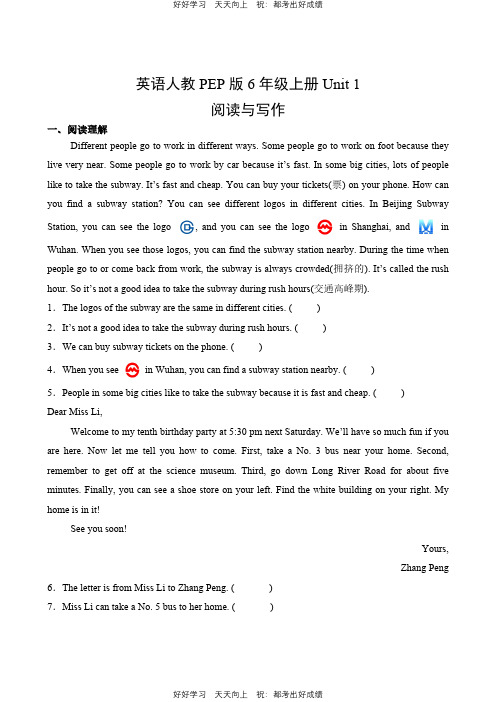
英语人教PEP版6年级上册Unit 1阅读与写作一、阅读理解Different people go to work in different ways. Some people go to work on foot because they live very near. Some people go to work by car because it’s fast. In some big cities, lots of people like to take the subway. It’s fast and cheap. You can buy your tickets(票) on your phone. How can you find a subway station? You can see different logos in different cities. In Beijing SubwayStation, you can see the logo , and you can see the logo in Shanghai, and in Wuhan. When you see those logos, you can find the subway station nearby. During the time when people go to or come back from work, the subway is always crowded(拥挤的). It’s called the rush hour. So it’s not a good idea to take the subway during rush hours(交通高峰期).1.The logos of the subway are the same in different cities. ( )2.It’s not a good idea to take the subway during rush hours. ( )3.We can buy subway tickets on the phone. ( )4.When you see in Wuhan, you can find a subway station nearby. ( )5.People in some big cities like to take the subway because it is fast and cheap. ( )Dear Miss Li,Welcome to my tenth birthday party at 5:30 pm next Saturday. We’ll have so much fun if you are here. Now let me tell you how to come. First, take a No. 3 bus near your home. Second, remember to get off at the science museum. Third, go down Long River Road for about five minutes. Finally, you can see a shoe store on your left. Find the white building on your right. My home is in it!See you soon!Yours,Zhang Peng 6.The letter is from Miss Li to Zhang Peng. ( )7.Miss Li can take a No. 5 bus to her home. ( )8.The color of the building isn’t white. ( )9.There is a shoe store near Zhang Peng’s home. ( )10.Zhang Peng’s home is on the left of Miss Li. ( )(Wu Yifan is asking a man on the street.)Wu Yifan: Excuse me. Where is the supermarket, please?Man: It’s next to the bookstore.Wu Yifan: Is it far from here?Man: No, it’s not far.Wu Yifan: How can I get there?Man: First, go straight and turn right at the cinema. Then turn left at the post office. Go straight for five minutes. You can find the supermarket on your left.Wu Yifan: Thank you.Man: You’re welcome.11.The man wants to go to the supermarket. ( )12.The hospital is next to the supermarkets. ( )13.Wu Yifan should turn right at the cinema. ( )14.Wu Yifan should turn left at the post office. ( )15.The supermarket is far from here. ( )Reading. 读一读,回答问题。
人教版六年级语文上册第一单元主题阅读(附答案)

第一单元主题阅读(阅读时能从所读的内容想开去。
)紫藤萝瀑布宗璞我不由得停住了脚步。
从未见过开得这样盛的藤萝,只见一片辉煌的淡紫色,像一条瀑布,从空中垂下,不见其发端,也不见其终极。
只是深深浅浅的紫,仿佛在流动,在欢笑,在不停地生长。
紫色的大条幅上,泛着点点银光,就像迸溅的水花。
仔细看时,才知道那是每一朵紫花中的最浅淡的部分,在和阳光互相挑逗。
这里春红已谢,没有赏花的人群,也没有蜂围蝶阵。
有的就是这一树闪光的、盛开的藤萝。
花朵儿一串挨着一串,一朵接着一朵,彼此推着挤着,好不活泼热闹!“我在开花!”它们在笑。
“我在开花!”它们嚷嚷。
每一穗花都是上面的盛开,下面的待放。
颜色便上浅下深,好像那紫色沉淀下来了,沉淀在最嫩最小的花苞里。
每一朵盛开的花就像是一个小小的张满了的帆,帆下带着尖底的舱。
船舱鼓鼓的,又像一个忍俊不禁的笑容,就要绽开似的。
那里装的是什么仙露琼浆?我凑上去,想摘一朵。
但是我没有摘。
我没有摘花的习惯。
我只是伫立凝望,觉得这一条紫藤萝瀑布不只在我眼前,也在我心上缓缓流过。
流着流着,它带走了这些时一直压在我心上的关于生死的疑惑,关于疾病的痛楚。
我浸在这繁密的花朵的光辉中,别的一切暂时都不存在,有的只是精神的宁静和生的喜悦。
这里除了光彩,还有淡淡的芳香,香气似乎也是浅紫色的,梦幻一般轻轻地笼罩着我。
忽然记起十多年前家门外也曾有过一大株紫藤萝,它依傍一株枯槐爬得很高,但花朵从来都稀落,东一穗西一串伶仃地挂在树梢,好像在察言观色,试探什么。
后来索性连那稀零的花串也没有了。
园中别的紫藤花架也都拆掉,改种了果树。
那时的说法是,花和生活腐化有什么必然关系。
我曾遗憾地想:这里再也看不见藤萝花了。
过了这么多年,藤萝又开花了,而且开得这样盛,这样密,紫色的瀑布遮住了粗壮的盘虬(qiú)卧龙般的枝干,不断地流着,流着,流向人的心底。
花和人都会遇到各种各样的不幸,但是生命的长河是无止境的。
我抚摸了一下那小小的紫色的花舱,那里满装生命的酒酿,它张满了帆,在这闪光的花的河流上航行。
人教pep英语六年级上学期阅读理解专题练习(含答案)1
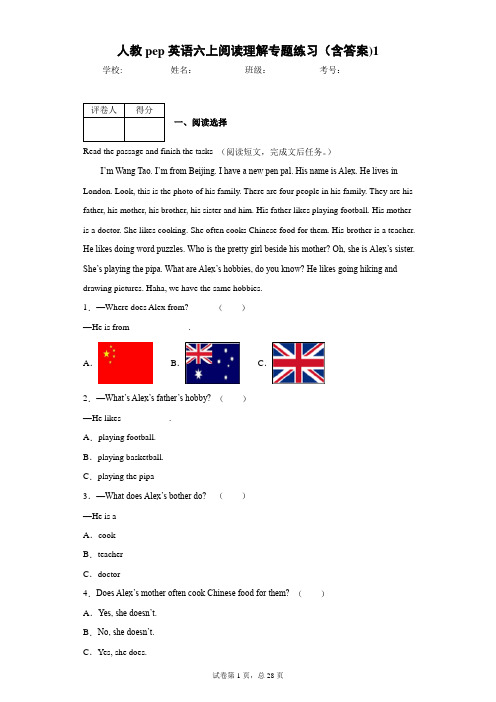
人教pep英语六上阅读理解专题练习(含答案)1 学校:___________姓名:___________班级:___________考号:___________一、阅读选择Read the passage and finish the tasks (阅读短文,完成文后任务。
)I’m Wang Tao. I’m from Beijing. I have a new pen pal. His name is Alex. He lives in London. Look, this is the photo of his family. There are four people in his family. They are his father, his mother, his brother, his sister and him. His father likes playing football. His mother is a doctor. She likes cooking. She often cooks Chinese food for them. His brother is a teacher. He likes doing word puzzles. Who is the pretty girl beside his mother? Oh, she is Alex’s sister. She’s playing the pipa. What are Alex’s hobbies, do you know? He likes going hiking and drawing pictures. Haha, we have the same hobbies.1.—Where does Alex from? ()—He is from _____________.A.B.C.2.—What’s Alex’s father’s hobby? ()—He likes _________.A.playing football.B.playing basketball.C.playing the pipa3.—What does Alex’s bother do? ()—He is a __________A.cookB.teacherC.doctor4.Does Alex’s mother often cook Chinese food for them? ()A.Yes, she doesn’t.B.No, she doesn’t.C.Yes, she does.5.—What’re my hobbies? ()—I like__________.A.going hiking and drawing picturesB.drawing pictures and playing the pipaC.going hiking and doing word puzzles阅读短文,选择正确的答案。
人教部编版六年级语文上册第一单元阅读训练(含答案)(2)

部编版六年级语文上册单元阅读训练第一单元一、基础阅读1.阅读下面的文字,完成后面的题目。
苜蓿和中午的妙境(节选)①我喜欢去植物园,是为了静。
②静,仿佛能使一切增加深度,不只是对那些抽象的东西如心灵、寂寞之类。
它使我听见鸟声,听见水声,听见四脚爬虫在草叶间窸窸窣窣的“走路”声,听见A_______……令耳朵听得更深。
它使我看见叶面上的“血脉”,看见树顶间的青天,看见B_______……令眼睛望得更远更细,仿佛可以看到天涯海角那无尽的脚边——也不过是一片极静的幽林。
③前几天,我偶然在中午的时候去了植物园。
满溢的阳光到处洒上了金粉,连曲径上的小碎石都艳了起来。
一切的静依然静着,却不知由哪儿飞来了许多花的访客——那些横飞的蜜蜂。
草地上躲躲藏藏的苜蓿透露着若隐若现的紫色消息,一只淘气的蜜蜂把它传给旁边的野花。
那野花像一朵淡黄的云,轻柔得仿佛轻风一吹就会散。
那只蜜蜂一站到花心上去,花茎就不胜负荷地弯垂了下来。
“太重啦!”仿佛有一声甜美的呼喊,()得蜂儿直()起来,花儿才又弹簧似的()回原位,()直了花梗。
(1)结合文章,说说你对“静,仿佛能使一切增加深度”的理解。
________________________________________________________________(2)仿照前面一句的内容,在第②段中的两处横线上分别补写一个句子。
(3)在第③段中横线上填上合适的动词。
(4)第③段的写作顺序是()。
A.动—静B.静—动C.静—动—静D.动—静—动(5)体会并写出下列句子中下划线词语的作用。
①满溢的阳光到处洒上了金粉,连曲径上的小碎石都艳了起来。
________________________________________________________________②草地上躲躲藏藏的苜蓿透露着若隐若现的紫色消息,一只淘气的蜜蜂把它传给旁边的野花。
________________________________________________________________2.阅读下文,回答问题。
六年级下语文第一单元课外阅读训练题 1含答案 人教统编版
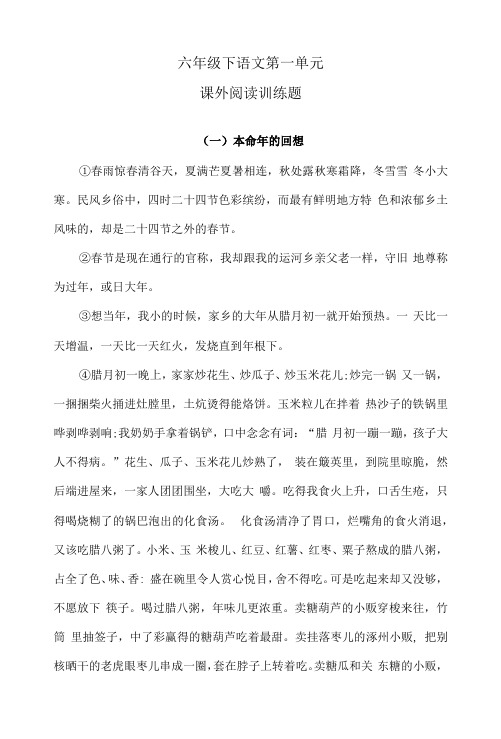
六年级下语文第一单元课外阅读训练题(一)本命年的回想①春雨惊春清谷天,夏满芒夏暑相连,秋处露秋寒霜降,冬雪雪冬小大寒。
民风乡俗中,四时二十四节色彩缤纷,而最有鲜明地方特色和浓郁乡土风味的,却是二十四节之外的春节。
②春节是现在通行的官称,我却跟我的运河乡亲父老一样,守旧地尊称为过年,或日大年。
③想当年,我小的时候,家乡的大年从腊月初一就开始预热。
一天比一天增温,一天比一天红火,发烧直到年根下。
④腊月初一晚上,家家炒花生、炒瓜子、炒玉米花儿;炒完一锅又一锅,一捆捆柴火捅进灶膛里,土炕烫得能烙饼。
玉米粒儿在拌着热沙子的铁锅里哗剥哗剥响;我奶奶手拿着锅铲,口中念念有词:“腊月初一蹦一蹦,孩子大人不得病。
”花生、瓜子、玉米花儿炒熟了,装在簸英里,到院里晾脆,然后端进屋来,一家人团团围坐,大吃大嚼。
吃得我食火上升,口舌生疮,只得喝烧糊了的锅巴泡出的化食汤。
化食汤清净了胃口,烂嘴角的食火消退,又该吃腊八粥了。
小米、玉米梭儿、红豆、红薯、红枣、粟子熬成的腊八粥,占全了色、味、香: 盛在碗里令人赏心悦目,舍不得吃。
可是吃起来却又没够,不愿放下筷子。
喝过腊八粥,年味儿更浓重。
卖糖葫芦的小贩穿梭来往,竹筒里抽签子,中了彩赢得的糖葫芦吃着最甜。
卖挂落枣儿的涿州小贩, 把别核晒干的老虎眼枣儿串成一圈,套在脖子上转着吃。
卖糖瓜和关东糖的小贩,吆喝叫卖,此起彼伏,自卖自夸。
还有肩扛着谷草把子卖绒花的小贩,谷草把子上插满五颜六色的绒花,走街串巷,大姑娘小媳妇把他们叫到门口,站在门槛里挑选花朵。
上年纪的老太太,过年也要买一朵红绒花插在小疙瘩鬃上。
村南村北、村东村西,一片杀猪宰羊的哀鸣。
鸡笼子里,喂养了一个月的肥鸡,就要被开刀问斩。
家家都忙着蒸馒头和年糕,穷门小户也要蒸出几天的豆馅团子。
天井的缸盖和筛子上冻豆腐,窗沿上冻柿子,还要渍酸菜。
妇女们忙得脚丫子朝天,男人们却蹲篱笆根晒太阳,说闲话儿。
腊月二十三过小年,香烛纸马送灶王爷上天。
人教部编版六年级语文上册第一单元阅读理解专项训练含答案

人教部编版六年级语文上册第一单元阅读理解专项训练素养阅读训练城南[宋]曾巩雨过横塘①水满堤,乱山高下②路东西③。
一番桃李花开尽,惟有青青草色齐。
【注释】①横塘:古塘名,在今南京城南淮河南岸。
②乱山高下:群山高低起伏。
③路东西:分东西两路奔流而去。
1.根据意思写诗句。
一场春雨使昔日艳丽的桃花和李花零落殆尽,只有春草没有被摧毁,反而长得青翠欲滴。
___________________________________________________________________________ 2.(新角度)理解诗句,完成下面的资料卡。
3.(语文要素)读了这首诗,我想到了描写青草的诗句:______________________________(温州真题)蜀鄙二僧(节选)蜀之鄙①有二僧,其一贫,其一富。
贫者语②于富者曰:“吾欲之③南海,何如?”富者曰:“子何恃④而往?”曰:“吾一瓶一钵⑤足矣。
”富者曰:“吾数年来欲买⑥舟而下,犹未能也。
子何恃而往?”越明年,贫者自南海还,以告富者,富者有惭色。
西蜀之去⑦南海,不知几千里也,僧富者不能至而贫者至焉。
人之立志,顾⑧不如蜀鄙之僧哉?【注释】①鄙:边远的地方。
②语(yù):告诉。
③之:这里用作动词,到。
④恃:凭借,依靠。
⑤钵:和尚盛食物的用具。
⑥买:租、雇的意思。
⑦去:距离。
⑧顾:这里用作副词,反而,难道。
1.以下与“人之立志”中“之”字意思相同的一项()A.蜀之.鄙有二僧B.吾欲之.南海C.西蜀之.去南海D.顾不如蜀鄙之.二僧哉2.根据选文内容,提取关键词句填表。
蜀鄙二僧志向态度结果富者①________ 吾数年来欲买舟而下,犹未能也③_____________贫者②____________________ 而贫者至焉3.作者通过“富者”“贫者”志向、态度和最终结果的______(写法),说明了()A.凡事都要立志。
B.凡事都要实践。
C.财富未必带来成功。
【精品】人教部编版六年级上册语文 第一单元课外阅读专项测试卷 含答案

第一单元课外阅读专项测试卷总分(100分)姓名:____________(一)山的图腾(26分)①一到西宁,便感觉到青海山川的不同凡响。
这里的奇峰峻岭和条条深邃的沟壑,使我的心灵受到阳刚的洗礼,引起我精神上的强烈震撼。
②那天我们乘车沿山谷间的栈道盘旋而去寻觅黄河的源头时,只见山路侧旁皆为红色的高山峻岭。
车子行驶于其中,如同盘旋在燃烧的火焰之中,让我内心升腾起一种从未有过的冲动。
友人邓友梅在途中看见山上耸立着的一块充满曲线美的红石时,诙谐地喊道:“看呐!那是诗人舒婷在山巅上向大地吟唱她的新诗呢。
”这个比喻可谓天衣无缝,因为那天舒婷刚好穿着一件红色的外衣,亭亭玉立之姿,颇像峰顶上那块婀娜多姿的红石。
舒婷没有反驳,她看着窗外的大山,自语道:“人在旅途中,已是美的享受。
”她的喃喃之语道破了高原上红色大山诱人的奇丽与娇美。
③这是远古天崩地裂时,天地造物之神,让大海沉沦地下,让红色高山凸起于东方大地上的杰作。
它诱惑一切游人的想象,因为这里不仅有友人戏言的“舒婷读诗”,还有纯天然的“亭”“台”“楼”“阁”;如果将它和时代的距离拉得更近一些,这层层叠叠耸立于云间的山峰,有的像原子弹爆炸后升腾起的蘑菇云,有的像一条条虹鳟鱼遨游于太空……其形之怪,其貌之绝,真是让我目不转睛,我直到双眼酸涩时,才愿意眨一眨眼皮。
④我询问司机大山的娃名。
他说:“这峡谷叫‘拉水峡’。
”⑤第二座令我为之动情的山峦,当属日月山了。
它古时的名字叫赤岭,但是密密的青稞与碧树绿草覆盖了整座山,凸显出它生命的永恒青春。
⑥当汽车向日月山的山脊上攀时,一个古老的故事盘升于我的心头。
公元641年,文成公主就是穿越这个山口进入西藏的。
翻越这座大山时,她因惜别故土,曾拿出父王赐她的日月宝镜,观看镜中“八水绕长安”的美景,泪水凄然而下。
此情此景,被奉命来接她的使臣发现,这使臣为驱散她的离情悲楚,偷偷把宝镜换成了石镜。
聪颖过人的文成公主见到石镜后,心中想道:便将宝镜摔碎了,以示诀别故土、踏进西藏的决心。
人教部编版六年级语文上册第一单元阅读训练(含答案)(4)

部编版六年级语文上册单元阅读训练第一单元一、基础阅读1.阅读下文,回答问题威尼斯之夜威尼斯蓝天的妩媚和夜空的可爱是无法用语言来描绘的。
在那明净的夜晚,河面水平如镜,连星星的倒影也不会有丝毫的颤动。
泛舟河上,四周一片蔚蓝、宁静,真是水天一色,使人仿佛进入绮丽的梦境一般。
空气那么清澈、透明,抬头望去,这儿的星星似乎远比我们法兰西北部夜空中的星星要多。
夜空到处布满星星,那深蓝的夜色都变淡了,融入了一片星辉。
如果你想领略一番这儿独有的清新和恬静,你可以在这迷人的夜晚去皇家花园附近,沿着大理石台阶往下,直到运河边上。
要是那里镀金的栅栏已经关上,那你可以乘坐一种名叫冈多拉的风格独特的威尼斯小艇,缓缓荡去,到那夕阳余温尚未散尽的石板小路旁,那里再也不会有人来打扰你的宁静。
晚风从椴树顶上轻轻吹过,把片片花瓣洒落到水面上,天竺葵和三叶草淡淡的芳香一阵阵向你袭来。
圣玛利亚教堂那雪花状石膏圆顶和螺旋形的尖塔在夜空中高高地耸立着,周围的一切,包括作为威尼斯三绝的碧水、蓝天和色调明丽的大理石,都给抹上了一层薄薄的银辉。
当圣马可大教堂顶楼上的钟声在空中徐徐回荡时,就会有一种难以言传的平静感透入你的灵魂,使你觉得整个身心都已溶化在那足以忘掉一切的安谧和静止之中了。
(1)根据下列词语的意思写出文中相应的词语。
①形容威尼斯的夜色美好、可爱。
________②形容威尼斯的夜色水天一色时鲜艳美丽的样子。
________③形容环境十分安静。
________(2)读第一自然段,这段三次写到星星,每次各起什么作用?请选择。
A.写星星多,突出夜色美。
B.写星星的明亮,突出夜空美。
C.写星星衬托湖面的平静。
①那明净的夜晚,河面水平如镜,连星星的倒影也不会有丝毫颤动。
________②抬头望去,这儿的星星似乎远比我们法兰西北部夜空中的星星要多。
________③夜空到处布满星星,那深蓝的夜色都变淡了,融入了一片星辉。
________ (3)第一自然段的中心句是________。
人教PEP 六年级英语上册 Unit1 阅读专训

The woodcutter doesn’t speak. He picks up a branch (树 枝) and writes a “主” on the ground. Then he goes away.
A. The hermit.
B. The woodcutter.
C. The writer.
点拨:根据“At this time, a woodcutter (樵夫) comes and Li Shizhen asks him the way.”及下文可知是樵夫给李时珍 指路的,故答案为B。
( A )3. What does the woodcutter mean? A. Li Shizhen should go to the right.
A. He lives in a village. B. He lives in a town. C. He lives in the mountains.
点拨:根据“The hermit lives in the mouห้องสมุดไป่ตู้tains.”可知 隐士住在山里,故答案为C。
( B )2. Who tells Li Shizhen how to go?
B. Li Shizhen should go to the left.
C. Li Shizhen should go straight.
点拨:根据“He picks up a branch (树枝) and writes a ‘主’ on the ground. ”可知他捡起一根树枝并在地上写了一个“主” 字,“主”是“往”字的右边,故答案为A。
六年级英语上册第一单元阅读能力综合训练-2(人教版含答案)
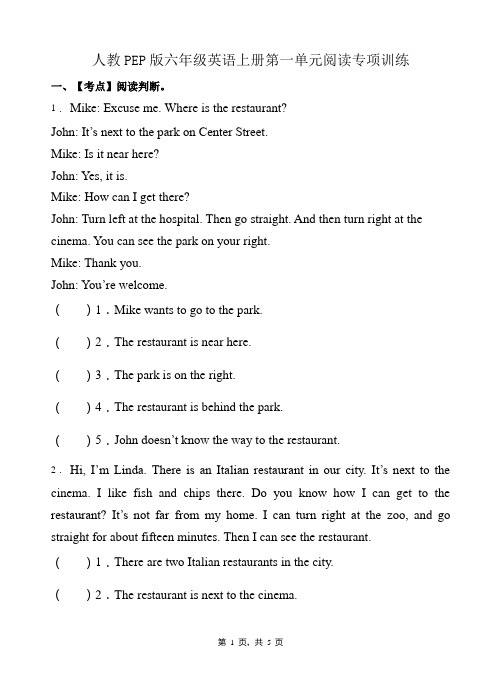
人教PEP版六年级英语上册第一单元阅读专项训练一、【考点】阅读判断。
1.Mike: Excuse me. Where is the restaurant?John: It’s next to the park on Center Street.Mike: Is it near here?John: Yes, it is.Mike: How can I get there?John: Turn left at the hospital. Then go straight. And then turn right at the cinema. You can see the park on your right.Mike: Thank you.John: You’re welcome.()1.Mike wants to go to the park.()2.The restaurant is near here.()3.The park is on the right.()4.The restaurant is behind the park.()5.John doesn’t know the way to the restaurant.2.Hi, I’m Linda. There is an Italian restaurant in our city. It’s next to the cinema. I like fish and chips there. Do you know how I can get to the restaurant? It’s not far from my home. I can turn right at the zoo, and go straight for about fifteen minutes. Then I can see the restaurant.()1.There are two Italian restaurants in the city.()2.The restaurant is next to the cinema.()3.Linda likes chicken there.()4.The restaurant is far from Linda’s ho me.()5.Linda can go straight for twenty minutes to the restaurant.二、【考点】阅读选择。
六年级上册语文- 第一单元课外阅读 (含答案)人教部编版
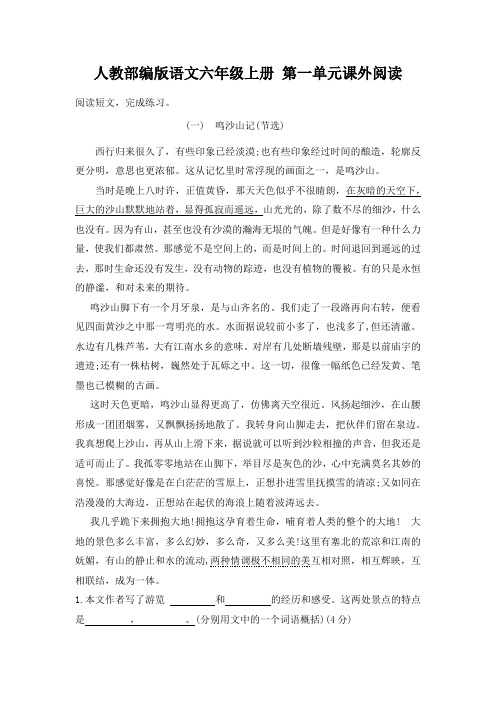
人教部编版语文六年级上册第一单元课外阅读阅读短文,完成练习。
(一)鸣沙山记(节选)西行归来很久了,有些印象已经淡漠;也有些印象经过时间的酿造,轮廓反更分明,意思也更浓郁。
这从记忆里时常浮现的画面之一,是鸣沙山。
当时是晚上八时许,正值黄昏,那天天色似乎不很睛朗,在灰暗的天空下,巨大的沙山默默地站着,显得孤寂而遥远,山光光的,除了数不尽的细沙,什么也没有。
因为有山,甚至也没有沙漠的瀚海无垠的气魄。
但是好像有一种什么力量,使我们都肃然。
那感觉不是空间上的,而是时间上的。
时间退回到遥远的过去,那时生命还没有发生,没有动物的踪迹,也没有植物的覆被。
有的只是永恒的静谧,和对未来的期待。
鸣沙山脚下有一个月牙泉,是与山齐名的。
我们走了一段路再向右转,便看见四面黄沙之中那一弯明亮的水。
水面据说较前小多了,也浅多了,但还清澈。
水边有几株芦苇,大有江南水乡的意味。
对岸有几处断墙残壁,那是以前庙宇的遗迹;还有一株枯树,巍然处于瓦砾之中。
这一切,很像一幅纸色已经发黄、笔墨也已模糊的古画。
这时天色更暗,鸣沙山显得更高了,仿佛离天空很近。
风扬起细沙,在山腰形成一团团烟雾,又飘飘扬扬地散了。
我转身向山脚走去,把伙伴们留在泉边。
我真想爬上沙山,再从山上滑下来,据说就可以听到沙粒相撞的声音,但我还是适可而止了。
我孤零零地站在山脚下,举目尽是灰色的沙,心中充满莫名其妙的喜悦。
那感觉好像是在白茫茫的雪原上,正想扑进雪里抚摸雪的清凉;又如同在浩漫漫的大海边,正想站在起伏的海浪上随着波涛远去。
我几乎跪下来拥抱大地!拥抱这孕育着生命,哺育着人类的整个的大地! 大地的景色多么丰富,多么幻妙,多么奇,又多么美!这里有塞北的荒凉和江南的妩媚,有山的静止和水的流动,两种情调极不相同的美互相对照,相互辉映,互相联结,成为一体。
1.本文作者写了游览和的经历和感受。
这两处景点的特点是,。
(分别用文中的一个词语概括)(4分)2.文中画横线的句子运用了什么修辞手法?有什么表达效果? (2分)3.第4自然段,作者站在沙漠中,想象自己在,,这两处想象和眼前沙漠的共同特点是。
- 1、下载文档前请自行甄别文档内容的完整性,平台不提供额外的编辑、内容补充、找答案等附加服务。
- 2、"仅部分预览"的文档,不可在线预览部分如存在完整性等问题,可反馈申请退款(可完整预览的文档不适用该条件!)。
- 3、如文档侵犯您的权益,请联系客服反馈,我们会尽快为您处理(人工客服工作时间:9:00-18:30)。
阅读每天练
Name Class
(1)
一、Choose best answer according to the passage.
My name is Jack. I come from London. I’m tall and strong. I like Chinese food very much, it is delicious. I often have noodles and beef. I can’t cook the meals, so I always have meals at school. My favourite food is beef and potatoes. They are tasty. I also like Beijing Duck very much. I can have it in the restaurant.
()1、Where is Jack from?
A. He is from China.
B. He is from America.
C. He is from England.
()2、What’s he like?
A. He is tall and thin.
B. He is short and strong.
C. He is tall and strong.
()3、What does he like?
A. He likes noodles and beef.
B. He likes beef and potatoes.
C. He likes duck.
()4、Can he cook the meals?
A. Yes, he can.
B. No, he can’t.
C. He doesn’t cook. ()5、Where can he eat Beijing Duck?
A. In the restaurant.
B. At school.
C. At home.
(2)
I’m John. I’m 12 years old. I’m helpful at home. I empty the trash every morning, and clean the floor every afternoon. When Mom is busy,I cook the meals at home. Mom often praises (表扬)me. She says I am helpful. In the school,I often help my teacher clean the board after class. ()1、Is John helpful?
A. Yes, he is.
B. No, he isn’t.
C. It doesn’t matter.()2、Which one can’t he do?
A.He can’t sweep the floor.
B. He can’t cook the meals.
C. He can’t wash clothes.
()3、When does John clean the floor?
A. In the morning.
B. In the afternoon.
C. In the evening.
()4、When does he cook the meals?
A. In the evening.
B. When he is free.
C. When mom is busy.
()5、What does he do at school?
A.He often cleans the floor.
B.He often cleans the window.
C.He often cleans the board.。
